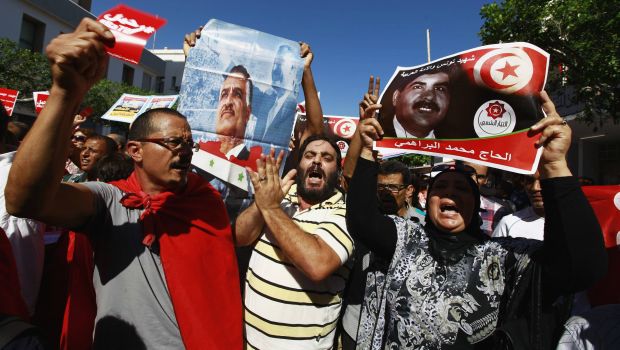
Protesters hold up and a picture of slain opposition leader Mohamed Brahmi during an anti-government demonstration rallying for the dissolution of the Islamist-led government in Sfax, 170 miles (270 km) southeast of Tunis, on September 26, 2013. (REUTERS/Anis Mili)
The negotiations aim to end weeks of crisis involving the Islamist-led coalition government and secular opposition parties that has threatened to scuttle the transition to democracy in the North African country where the Arab Spring uprisings began in 2011.
Tunisia’s powerful UGTT labor union, mediating between the two sides, proposed the ruling Islamist Ennahda party agree to three weeks of negotiations, after which it would step down and make way for an independent transitional administration and set a date for elections.
“The dialogue will start on Monday or Tuesday,” Lotfi Zitoun, an Ennahda party official, said. “Ennahda has accepted the plan without conditions to get the country out of the political crisis.”
Another source close to the talks confirmed Ennahda had agreed to the proposal.
Since autocrat Zine El-Abidine Ben Ali was ousted in 2011 after street protests against his rule, Tunisia has struggled with divisions over the political role of Islam. The opposition accuses Ennahda of imposing an Islamist agenda on one of the Muslim world’s most secular nations.
Tunisia’s path to transition, however, has been mostly peaceful compared to Egypt where the army toppled an elected Islamist president and Libya, where the central government struggles to curb rival militia influence.
Tunisia’s political crisis erupted in July after the killing of an opposition leader by suspected Islamist militants, bringing the opposition on to the streets to demand Ennahda step down.
